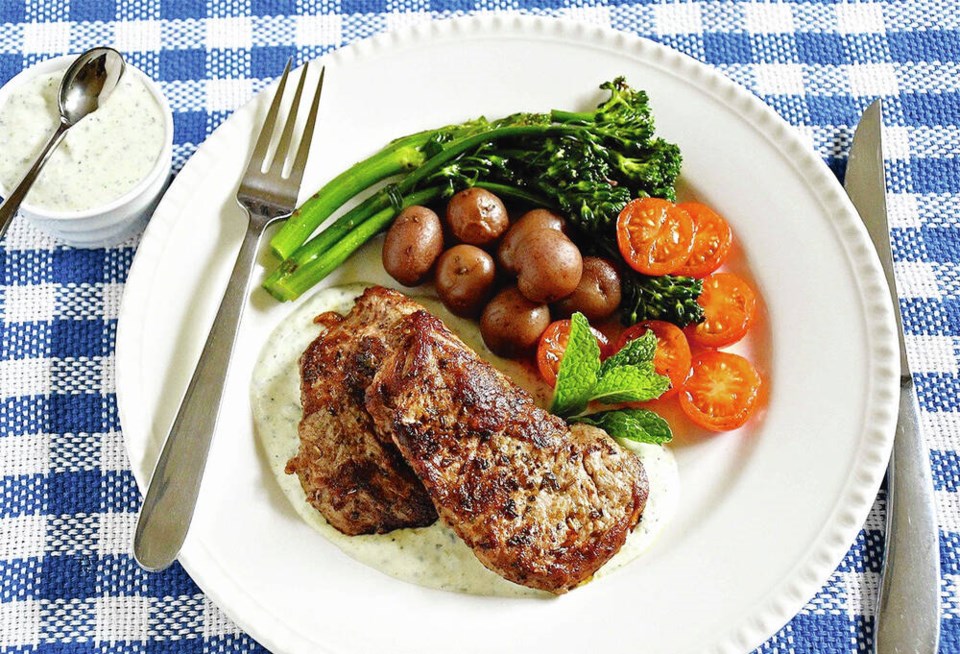I know my garden is in full spring growing mode when my perennial mint plants start showing new leaves. That makes me start thinking about ways to use the bounty of mint I’ll have as the season progresses.
My first idea was to use mint in something savoury. After bouncing around a few ideas, I decided to make a Greek-style pork dish.
The pork I used was pork tenderloin, which I cut into pieces, pounded into medallions, seasoned and seared until it was cooked through and richly coloured. The one thing missing was some sort of sauce to serve with the pork, which is where the mint came in.
In a small food processor, I blended fresh mint leaves with Greek-style yogurt, lemon juice, honey, garlic, green onions and seasonings.
The end result was a fresh-tasting, tangy, minty, flavourful sauce that nicely complemented the seared pork medallions.
If you don’t have a food processor, you could make the sauce by finely chopping the mint, garlic and green onions on a cutting board, and then mixing them with the sauce’s other ingredients in a bowl.
You can make and refrigerate the minty yogurt sauce many hours in advance of serving it. As it sits, its flavour will further develop. You can also cut and pound out the pork medallions many hours before cooking them. If you do, keep them covered and refrigerated until you’re ready to season and cook them.
My recipe for the pork and sauce serves two, but could be doubled or further expanded for a larger group.
I served the pork and sauce with boiled miniature potatoes, steamed broccolini and sautéed cherry tomatoes. But you could also trying serving it with different side dishes, such as orzo, Greek salad and wedges of pita bread.
Beyond pork, the minty yogurt sauce could be served with such things as seared or grilled lamb chops, baked or grilled salmon fillets or steaks, and vegetable kebabs.
Greek-style Pork Medallions with Minty Yogurt Sauce
Pork tenderloin is cut into pieces, pounded into medallions, seasoned, seared and served with a fresh and tangy yogurt sauce flavoured with mint.
Preparation time: 25 minutes
Cooking time: six minutes
Makes: two servings
1/2 cup plain Greek-style yogurt
12 medium to large fresh mint leaves
1 medium green onion, thinly sliced
1 medium garlic clove, chopped
2 tsp lemon juice
1 tsp honey
1/4 tsp ground cumin
• tiny pinch ground cayenne pepper
• salt and freshly ground black pepper, to taste
1 (375 to 400 gram) piece of pork tenderloin, trimmed of any fat or silverskin (see Note)
1 Tbsp olive oil + 3 tsp (divided)
3/4 tsp dried oregano
1/2 tsp dried sage leaves
1/2 tsp paprika
• fresh mint sprigs, for garnish
Place the yogurt, mint, green onion, garlic, lemon juice, honey, cumin and cayenne pepper in a small food processor. Pulse until the mint is finely chopped and well combined with the other ingredients. Taste and season this minty yogurt sauce with salt and pepper. Transfer sauce to a bowl, cover and refrigerate. It can be made a few hours before needed. Give the sauce a stir just before using.
To prepare the pork, cut the pork tenderloin, widthwise, into four roughly equal pieces. Now set those pieces upright, spacing each one a few inches apart. (You’ll have to press on the flatter, tail end piece of tenderloin to make it sit upright.) Cover the pork with plastic wrap. Now use a kitchen hammer to pound each piece into a 3/4-inch thick medallion. Place the pork medallions in a sided dish. Add 1 Tbsp + 2 tsp of the oil, oregano, sage and paprika and toss to coat each medallion with those ingredients.
Place the remaining 1 tsp oil in a 10-inch or similar sized non-stick or cast iron skillet set over medium-high heat. Season each pork medallion with salt and pepper, set in the skillet and sear three minutes on each side, or until just cooked through. Remove skillet from the heat.
Spread a generous amount of the minty yogurt sauce on one side of each of two dinner plates. Set two pork tenderloin medallions on the sauce on each plate, garnish with mint sprigs, and serve.
Note: Before cutting a whole piece of pork tenderloin as described in this recipe, be sure to remove the silverskin, a silvery, tough connective tissue that runs along the top of the flesh (unless the butcher has already done so). To do that, starting about two and half centimetres from either end of the tenderloin, slide your sharp, thin-bladed knife under a strip of it. Use your non-cutting hand to hold the silverskin taut and then, with your knife angled upward, slide it down the tenderloin to remove it.
Eric Akis is the author of eight cookbooks. His columns appear in the Life section Wednesday and Sunday.



